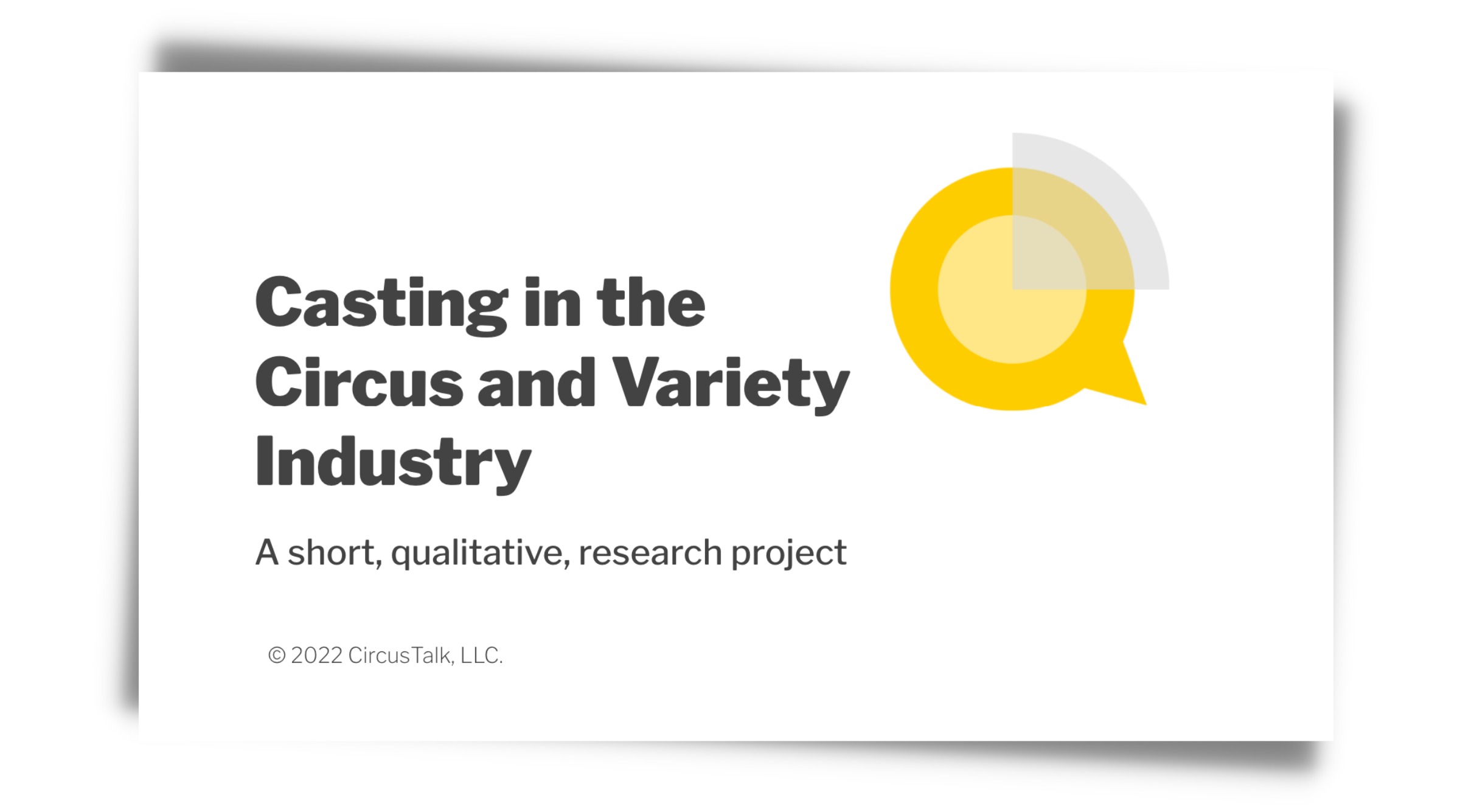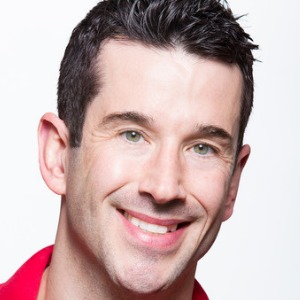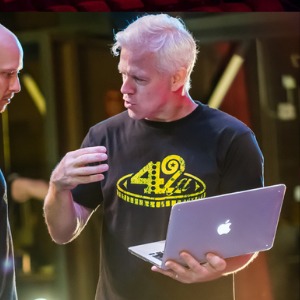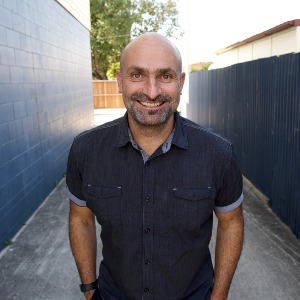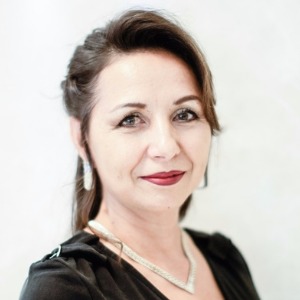Connecting the Dots: A Casting Conversation with Talent Seekers
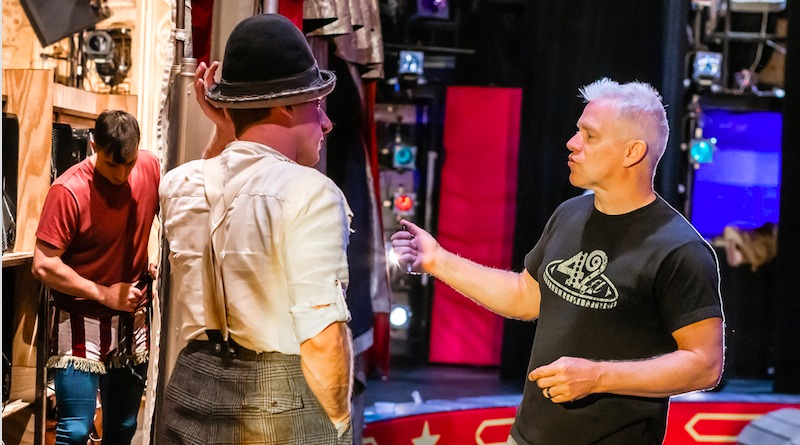
This winter, the COVID-19 pandemic will mark its grim two-year milestone. Meanwhile, the performing arts industry continues its tireless preparations to rebound, redefine and one day, recover. Behind the scenes, CircusTalk’s growing focus on job opportunities, casting, and career advice motivated a research project spotlighting employment and casting infrastructures in the industry. The aim? To better understand the casting models and processes used to find talent, and to assess whether there is an appetite for innovation in casting. What follows is a summary of the results of this casting research.
I spoke with a diverse collection of international talent seekers representing various sectors of circus and the performing arts who generously contributed their professional insight. The topics ranged from their personal work practices to their thoughts on multi-skill performers to the role of technology and social media in their casting process.
.
Human Connections
 While personal experiences and professional work styles varied, the resounding takeaway across all interviewees was the importance of the talent’s personality and soft skills, which most talent seekers felt can really only be assessed through a human evaluation. As producer Rob Tannion of Cluster Arts puts it, “It’s about the more humanistic skills. Are they a team player? How are they in a creative process?”
While personal experiences and professional work styles varied, the resounding takeaway across all interviewees was the importance of the talent’s personality and soft skills, which most talent seekers felt can really only be assessed through a human evaluation. As producer Rob Tannion of Cluster Arts puts it, “It’s about the more humanistic skills. Are they a team player? How are they in a creative process?”
I’m a believer in the concept of “fit” when it comes to casting, and my version of fit has nothing to do with skillset and physical profile. In an audition, I’ll look for the artist who stands up first to help move a mat, or the person whose natural confidence draws other candidates into their circle. I’ll observe human behavior, such as how an artist responds to a change in the day’s schedule, and who watches— and cheers for— all the other presentations.
Evaluating a potential employee’s coachability, resilience, and flexibility is important in every work setting, but especially in circus, because circus work is so varied: industry pros enjoy long-term contracts, one-time events, big shows, tiny casts, and everything in between. Show and touring conditions also factor into “fit,” simply because not everyone will thrive in every environment. Whatever the format, Cirque Mechanics’ founder Chris Lashua describes his position clearly: “Are they someone we’re going to want to play with?”
Diving deeper into the human relations aspect, casting experts agree that forming a personal connection and understanding the person behind the artist matters. Why? “Because we know that the rehearsal process and touring and all these things can become so intimate and personal, so it’s really important to understand somebody’s personality,” says Francisco Cruz, associate artistic director of Les 7 Doigts.
Carolyn Blair, client success manager with Talent Systems, says, “Self-tape opened up a new arena. Self-tape is a trend, but in-person will stay. You can never do a chemistry read on Zoom.”
Stephanie Jansen, senior manager of theatrical productions for Celebrity Cruises, adds, “The performer has a job with a company, but also a relationship with a choreographer, a relationship with a director… and we need to work together.”
Indeed, when considering talent, talent seekers are looking for the hallmarks of a good relationship: trustworthiness and communication. Charlie Burrows, founder of the International Casting Agency, says casting is about “personal communication. Direct, one-on-one communication with people that I have built a relationship with.” Art Manager and Director of Stefani Art Stars Agency, Veneta Stefanova agrees: “It’s the personal connection and understanding whether you have shared values so that you can work either with the client in a healthy way, or with the artist in a meaningful way.”
.
The Future Is Multidisciplinary
Although different sectors and genres of circus seek different kinds of talent– we’re the circus, after all!– interviewees agreed that today’s talent marketplace is rife with multidisciplinary performers. And for good reason: it offers artistic versatility and opens creative opportunities for productions while keeping the headcount to a minimum. In other words: multi-skilled performers offer more bang for the buck for casting specialists looking to provide variety and diversity to show creations.
As Artistic Director (and doctoral fellow at Columbia University) Chris Houston says, “When you combine many elements and many disciplines from the performing arts it makes the experience so much fuller. It leaves (the audience) feeling much more fulfilled.”
Vicki Amedume is the artistic director and CEO of Upswing, and associate director of The New Vic and The Albany. She says, “Where I work, we look for people with multi skills, not circus primarily, but also other skills. When I first started making circus theater collaborations, it was really hard to find people with a high technical level of circus who could dance well, or act, or sing, or play a musical instrument. And I’m starting to see more and more people with a range of different disciplines.”
Talent seekers, especially those whose roles influence creative decisions, recognize and encourage this trend. Artistic Director Matthew Jessner says, “When you get a really highly specialized hybrid performer where the combination of disciplines is extremely rare, it’s a fantastic thing.” Louanne Madorma, a casting director, producer, and director, agrees: “Many of the circus artists that I work with cross-pollinated into a multitude of different disciplines, which is extremely important. My job as a casting director is to give the director or the choreographer as much of a playground as I possibly can. I wholeheartedly believe that an artist cannot be a one-trick pony in today’s world.”
Outside the circus industry, “multidisciplinary” resonates just as strongly. Film, television, and theatrical agent Roger Paul agrees that in today’s market, performers need to have diverse training: circus artists can benefit from acting lessons and improv, while actors with special skills in their toolkit can set themselves apart from the competition.
Artists, take note: multidisciplinary or hybrid performers are still expected to have at least one strong (“outstanding” came up a few times during the research) discipline. Cruz cautions, “Sometimes artists go so crazy in all these different ways, trying to be a multidisciplinary artist, that they end up losing out on having a core skill that blows people away.”
.
Know Your Network
It’s no surprise that the “business” of networking and relationship-building ranks as highly important among talent seekers. Ryan Saab, SVP of talent casting for RWS Entertainment Group, explains, “Relationships in this industry are integral; they’re crucial. Not only do I encourage my team to develop contacts outside of the cruise ship or musical theater genre, we’re looking for good solid relationships within the entire industry. And we lean on those all the time. Collaboration for us is a huge, huge thing.”
While personal connections are important, most of our casting experts went even further to emphasize that peer endorsement is highly valued. The link between personality, reputation, and career success is evident. “It is almost always another artist who tells me about someone they know. There’s a huge side of casting that goes hand in hand with talent, and that is personality and reputation,” says Madorma.
On the subject of industry events, only one quarter of interviewees consider travel to be an important tool in casting. But don’t be fooled; the real value of travel and presence at industry events is— you guessed it— the networking. “It’s good for networking, seeing friends. A great way for us to engage with the circus community and to be visible and to see what’s going on,” Lashua says.
Malu Ansaldo, an international programming and producing consultant, adds: “Travel and yes, presence, is an important criteria, but it’s actually the interpersonal connections that happen as a result of that travel. The people that I’ve met on my travels and that I establish a relationship with are usually the people that I end up doing more business with.”
Whether in attendance to seek out new talent, to promote the talent they represent, or to connect and stay connected, talent seekers are ready for the return of industry events.
.
Technology as a Tool
Interviewees unanimously agreed that advancements in technology, the internet and social media have fundamentally influenced the casting process.
On the role of technology in their work, interviewees’ needs centered on creating an efficient and streamlined workflow, with filtering, tagging, and storing media files being paramount. Gone are the days of VHS cassettes and DVD demos. When I first began in casting, each talent scout had a mobile TV stand equipped with a monitor and various media players at their desk. Imagine that!
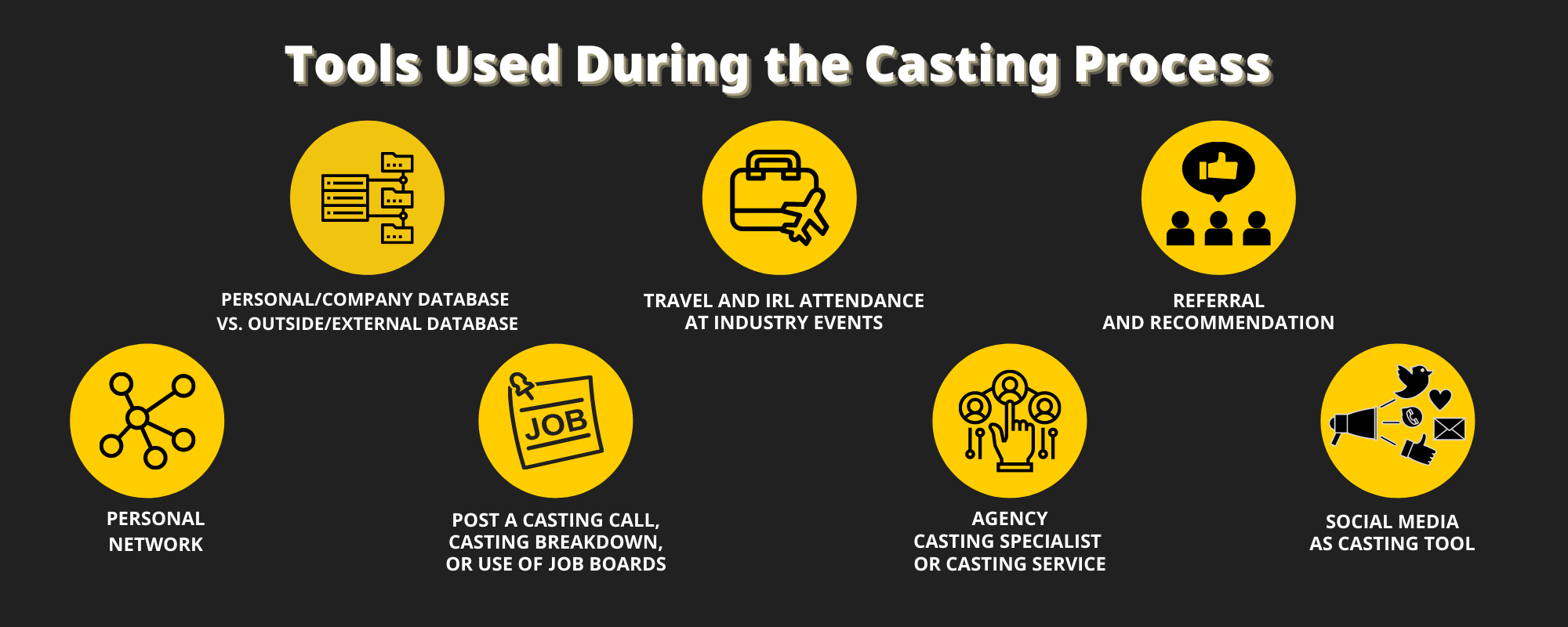
100% of talent seekers interviewed use a database of some sort, whether the resource is personal or company-supported. All agreed that technology supports their casting process: even today’s most basic tech tools organize email inboxes, offer historical data, and are equipped to store massive amounts of data. “I am very used to a technology-based way of working, so I like to keep things organized using technology,” says Burrows.
Content management is important, but digital transformation benefits talent— and the industry— as well. Today, online job applications and talent profiles are the industry standard. Digital demo submissions help to level the playing field and make talent seekers more accessible to artists in search of work. Having one’s demo be viewed by a casting expert should be less about “who you know”— at least in terms of initial contact— and more about how one chooses to present themselves in a video.
Talent seekers may rely on networks and building relationships, but expanding those networks beyond individual geographic, social, and cultural boundaries is where an international database really adds value. “(Many companies) have made big adjustments in trying to reach out to communities of color and of diverse backgrounds, race, gender, identity… increasingly we need to look further outside of our personal networks,” Lashua says.
My take? Know your network, and grow your network. Amedume also shares her contacts: “I’m finding that I’m feeding a lot of new circus artists into casting directors’ networks because they don’t have a database of circus practitioners.”
Talking about databases circled Saab back to human connections. He and his team evaluate thousands of candidates each year, so using technology is a must for an efficient workflow. The more streamlined the operation, the more time they can spend making talent feel good about the company. This is advantageous for everyone, as he explains, “… we’re able to not only do our jobs better but offer everybody an amazing experience when they come through the doors or when they submit to us online. Our interaction with potential talent is going to be a deeper, richer experience.”
.
Social Media; Yay or Nay?
A March 2021 Statista Research project revealed that the percentage of the global population using Facebook is 35.6%. North America tops the list with a 71.3% Facebook usage rate, while Latin America and the Caribbean (69.5%) and Europe (62.4%) round out the top three regions in the world.
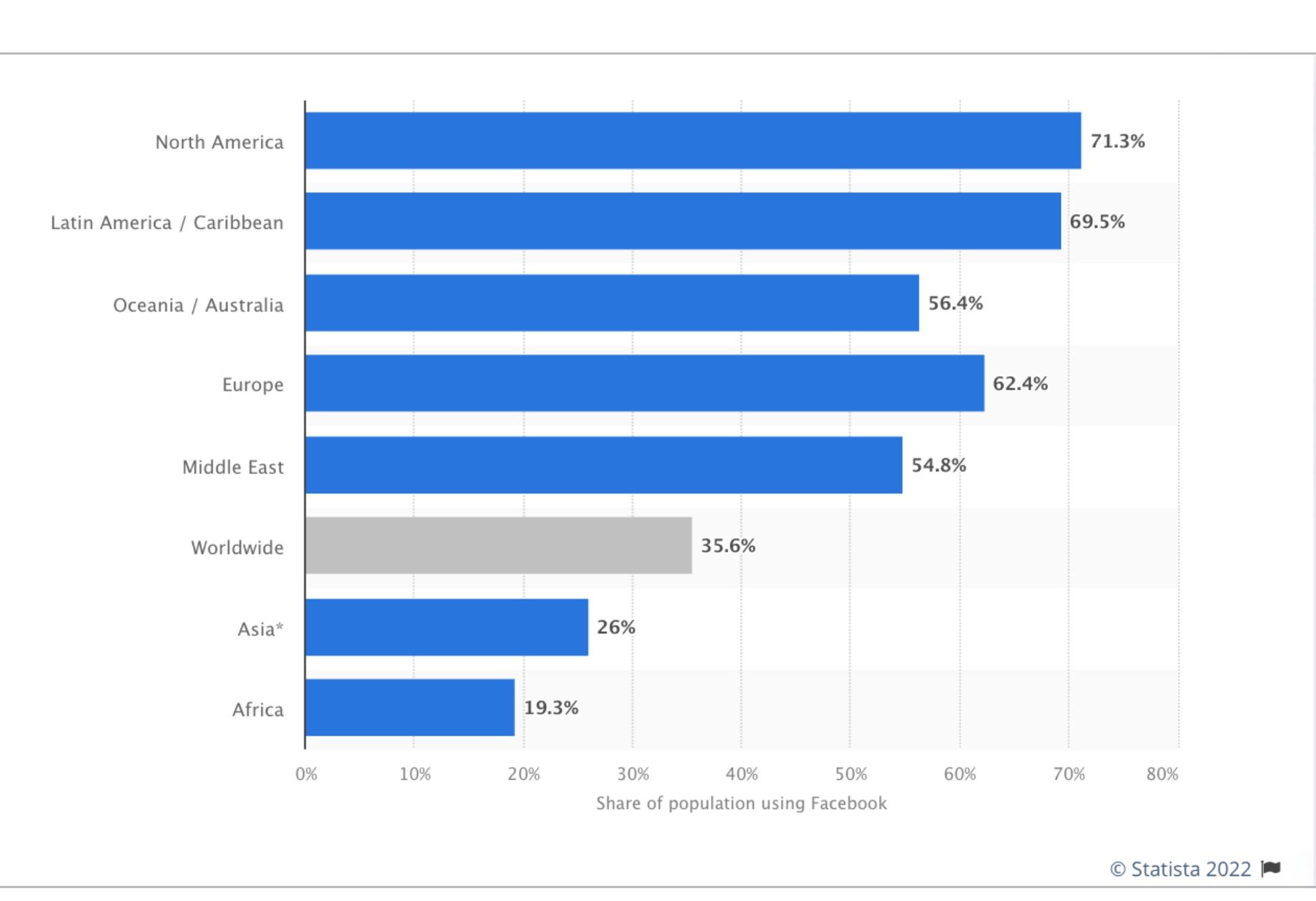
In the entertainment industry, working with independent casting databases and breakdown services is a common practice, embraced by casting directors, agents and performers alike. Not so— or at least, not yet— in circus arts, where professionals still rely heavily on social media when it comes to finding talent:”I don’t know how I’d be able to cast without social these days,” says Rene Massie, casting director and talent producer.
Some interviewees referred to social media as an external database, with its own pros and cons.
One thing is clear, however: while social media may not meet many of the workflow requirements of a talent seeker, its simplicity and propagation rate makes social channels a major source for casting. “Cast the net wide and fish where the fish are,” says Madorma. Cruz agrees: “Instagram changed the casting game a hundred percent.”
Many talent seekers— and I’ll indulge myself by adding that this is true for me as well— have a love-hate relationship with social media. I see social media as a supplementary tool, an add-on to hard skills (i.e., technical prowess) and soft skills, like professionalism and openness.
Social media mastery does not equal a sustainable career. Popularity and reach aside, most talent seekers agree that social media can be a misleading metric. “People are tending to want to shortcut through social media platforms… It’s a case of the Instabat: where people post a skill that they may have tried 50 times. They nailed it once, and yet they’ve plastered it all over. We get this very skewed view of what skill set someone has or does not have,” says Tannion.
Is it a generational thing? I’ve asked myself that question, and perhaps my peers have, too. TOHU’s Head of Circus Programming Thomas Lenglart says, “I don’t know if it’s the artist’s job to advertise themselves. Young artists are on social media, but we cannot miss the ones that don’t want to be there.” Jessner weighs in that “using (social media) is like shopping: Amazon casting.” Yet in many parts of the world, Amazon is hugely popular, and love it or hate it, the business model works. Kristoff Estefano, founder of The International Artist Agency, works the social channel angle and the personal connection angle, saying, “I post that I’m looking for a flying trapeze act and get 80 acts except flying trapeze… So now I work more with context. I write a casting call for flying trapeze artists and say, ‘Got any friends or colleagues available?’ And then they pass me through.”
.
What’s Next?
What seems to be lacking within casting is a tangible way to measure success— in business terms, the return on investment. Most talent seekers view success through the lens of what ultimately happens on stage or during the casting process itself: a positive candidate application or audition experience (loyal future talent!), and/or a cast whose personal bonds are evident both on stage and off (happy people!).
Ultimately, this esteemed group of talent seekers weren’t able to identify significant innovation happening in the casting space, although there is certainly an interest and an openness to it. Interest, because optimized work practices help us all do our jobs better. And openness, because the pandemic has taught some important lessons. Work-life balance matters, so if we’re more efficient, perhaps by commuting less and managing our time well, it leaves more room for everything (and everyone) else. Human connections matter and— sometimes counter-intuitively–- technology supports us in forming them. And finally, to quote the Greek philosopher Heraclitus, the only constant in life is change.
As the industry emerges from COVID-enforced restrictions, I am excited to see which casting practices return to pre-pandemic “normal” and whether more space may be carved out for innovation. In my role as CEO of CircusTalk, I’ll be facing the challenge head-on, and I invite your voices into the conversation.
Here’s to the rebounding and reinvention of the circus arts industry!
.
[Click on the image to access the complete research.]
.
.
We thank all the participants!
.
.
.
Photo: casting professional Chris Lashua provides some backstage advice. Photo is courtesy of Chris Lashua.
.
Editor's Note: At StageLync, an international platform for the performing arts, we celebrate the diversity of our writers' backgrounds. We recognize and support their choice to use either American or British English in their articles, respecting their individual preferences and origins. This policy allows us to embrace a wide range of linguistic expressions, enriching our content and reflecting the global nature of our community.
🎧 Join us on the StageLync Podcast for inspiring stories from the world of performing arts! Tune in to hear from the creative minds who bring magic to life, both onstage and behind the scenes. 🎙️ 👉 Listen now!
